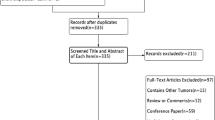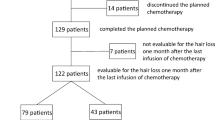Abstract
Chemotherapy-induced alopecia is a common side effect of breast cancer therapies. Thus, the objective of this study was to carry out a bibliographic survey concerning the effectiveness of scalp cooling in alopecia of patients undergoing treatment for breast cancer. The search was conducted in the databases LILACS (Latin American and Caribbean Literature in Health Sciences), PubMed, Science Direct, Scopus, and Web of Science, by using “scalp cooling” AND “breast cancer” as search terms. Articles from the last 5 years were selected, which included cohort studies, case reports, and randomized studies. The final sample consisted of 16 publications. Data from the studies revealed that the use of hypothermic cap was effective in reducing alopecia. In addition, factors such as temperature and time of cap usage, dose and combination of medications, and hair care influenced in the reduction of hair loss. It was possible to observe that treatment schedules without anthracyclines were more responsive to the effects of scalp cooling, reducing hair loss. Therefore, this study gathered relevant information, showing that scalp cooling is effective and its use should be encouraged by health professionals.


Similar content being viewed by others
References
INCA. Estimativas 2020. Rio de Janeiro: Instituto Nacional de Câncer José Alencar Gomes da Silva - INCA; 2020.
INCA. ABC do Cancer - Abordagens Básicas para o Controle do Cancer. Instituto Nacional de Câncer José Alencar Gomes da Silva - INCA, Rio de Janeiro. 2019 5. ed. rev. atual.: 1-111.
Kotsopoulos J, Chen WY, Gates MA, Tworoger SS, Hankinson SE, Rosner BA. Risk factors for ductal and lobular breast cancer: results from the nurses’ health study. Breast Cancer Res. 2010;12:R106.
Bray F, Ferlay J, Soerjomataram I, Siegel RL, Torre LA, Jemal A. Global cancer statistics 2018: GLOBOCAN estimates of incidence and mortality worldwide for 36 cancers in 185 countries. Ca-a Cancer Journal for Clinicians. 2018;68:394–424.
NCI. National Cancer Institute - Cancer types - breast cancer. In: Editor (ed)^(eds) Book National Cancer Institute - Cancer types - breast cancer, City. 2020.
Munzone E, Bagnardi V, Campennì G, Mazzocco K, Pagan E, Tramacere A, et al. Preventing chemotherapy-induced alopecia: a prospective clinical trial on the efficacy and safety of a scalp-cooling system in early breast cancer patients treated with anthracyclines. Br J Cancer. 2019;121:325–31.
Fushimi A, Shinozaki N, Takeyama H. Hair regrowth using a properly fitted scalp cooling cap during adjuvant chemotherapy for breast cancer. Int Cancer Conf J. 2019;8:181–4.
Kinoshita T, Nakayama T, Fukuma E, Inokuchi M, Ishiguro H, Ogo E, et al. Efficacy of scalp cooling in preventing and recovering from chemotherapy-induced alopecia in breast cancer patients: the HOPE study. Front Oncol. 2019;9.
Godone RLN, Leitão GM, Araújo NB, Castelletti CHM, Lima-Filho JL, Martins DBG. Clinical and molecular aspects of breast cancer: targets and therapies. Biomed Pharmacother. 2018;106:14–34.
Cortés J, Ciruelos E, Pérez-García J, Albanell J, García-Estévez L, Ruiz-Borrego M, et al. Contextualizing pertuzumab approval in the treatment of HER2-positive breast cancer patients. Cancer Treat Rev. 2020;83:101944.
Lemieux J, Maunsell E, Provencher L. Chemotherapy-induced alopecia and effects on quality of life among women with breast cancer: a literature review. Psycho-Oncology. 2008;17:317–28.
Rosman S. Cancer and stigma: experience of patients with chemotherapy-induced alopecia. Patient Educ Couns. 2004;52:333–9.
Smith IE. Prevention of doxorubicin-induced alopecia by scalp hypothermia: relation to degree of cooling. Bmj. 1982;284:1954.
Edelstyn G. Doxorubicin-induced hair loss and possible modification by scalp cooling. Lancet. 1977;310:253–4.
Bajpai J, Kagwade S, Chandrasekharan A, Dandekar S, Kanan S, Kembhavi Y, et al. Randomised controlled trial of scalp cooling for the prevention of chemotherapy induced alopecia. Breast. 2020;49:187–93.
Paxman (2020) Resfriamento Capilar - Profissionais da Saúde. In: Editor (ed)^(eds) Book Resfriamento Capilar - Profissionais da Saúde, City.
Cigler T, Isseroff D, Fiederlein B, Schneider S, Chuang E, Vahdat L, et al. Efficacy of scalp cooling in preventing chemotherapy-induced alopecia in breast cancer patients receiving adjuvant docetaxel and cyclophosphamide chemotherapy. Clin Breast Cancer. 2015;15:332–4.
Massey CS. A multicentre study to determine the efficacy and patient acceptability of the Paxman Scalp Cooler to prevent hair loss in patients receiving chemotherapy. Eur J Oncol Nurs. 2004;8:121–30.
Dignicap (2020) Dignicap - Refrigeração do couro cabeludo. In: Editor (ed)^(eds) Book Dignicap - Refrigeração do couro cabeludo, City.
Giarratano T, Frezzini S, Zanocco M, Giorgi CA, Mioranza E, Miglietta F, et al. Use of scalp cooling device to prevent alopecia for early breast cancer patients receiving chemotherapy: a prospective study. Breast J. 2019.
Penguin (2020) Penguin Cold Caps - how it works. In: Editor (ed)^(eds) Book Penguin Cold Caps - how it works, City.
Bordignon JS, Rocha BD, Prevedello BP, Beck EQ, Castro P, Smeha LN, et al. Hipoglicemia neonatal: Revisão Integrativa. Disciplinarum Scientia. 2018;19:639–349.
Mendes KDD, Silveira RCCP, Galvão CM. Revisão integrativa: método de pesquisa para incorporação de evidências na saúde e na enfermagem. Texto e contexto enferm. 2008;17:758–64.
Melnyk BM, Foneout-Overholt E. Making the case for evidence-based practice. Lippincot Williams & Wilkins: Evidence-based practice in nursing & healthcare A guide to best practice. Philadelphia; 2005. p. 3–24.
Smetanay K, Junio P, Feißt M, Seitz J, Hassel JC, Mayer L, et al. COOLHAIR: a prospective randomized trial to investigate the efficacy and tolerability of scalp cooling in patients undergoing (neo)adjuvant chemotherapy for early breast cancer. Breast Cancer Res Treat. 2018;173:135–43.
Choi EK, Kim I-R, Chang O, Kang D, Nam S-J, Lee JE, et al. Impact of chemotherapy-induced alopecia distress on body image, psychosocial well-being, and depression in breast cancer patients. Psycho-Oncology. 2014;23:1103–10.
Shaw J, Baylock B, O’Reilly A, Winstanley J, Pugliano L, Andrews K, et al. Scalp cooling: a qualitative study to assess the perceptions and experiences of Australian patients with breast cancer. Support Care Cancer. 2016;24:3813–20.
Komen MMC, Smorenburg CH, Hurk CJG, Nortier JWR. Factors influencing the effectiveness of scalp cooling in the prevention of chemotherapy-induced alopecia. Oncologist. 2013;18:885–91.
Komen MMC, Smorenburg CH, Nortier JWR, van der Ploeg T, van den Hurk CJG, van der Hoeven JJM. Results of scalp cooling during anthracycline containing chemotherapy depend on scalp skin temperature. Breast. 2016;30:105–10.
Komen MMC, van den Hurk CJG, Nortier JWR, van der Ploeg T, Nieboer P, van der Hoeven JJM, et al. Prolonging the duration of post-infusion scalp cooling in the prevention of anthracycline-induced alopecia: a randomised trial in patients with breast cancer treated with adjuvant chemotherapy. Support Care Cancer. 2018;27:1919–25.
Komen MMC, van den Hurk CJG, Nortier JWR, van der Ploeg T, Smorenburg CH, van der Hoeven JJM. Patient-reported outcome assessment and objective evaluation of chemotherapy-induced alopecia. Eur J Oncol Nurs. 2018;33:49–55.
Komen MMC, Breed WPM, Smorenburg CH, van der Ploeg T, Goey SH, van der Hoeven JJM, et al. Results of 20- versus 45-min post-infusion scalp cooling time in the prevention of docetaxel-induced alopecia. Support Care Cancer. 2016;24:2735–41.
Rice BA, Ver Hoeve ES, DeLuca AN, Esserman LJ, Rugo HS, Melisko ME. Registry study to assess hair loss prevention with the Penguin Cold Cap in breast cancer patients receiving chemotherapy. Breast Cancer Res Treat. 2017;167:117–22.
Chabner BA, Longo DL. Manual de Oncologia de HARRISON. Editora AMGH - Porto Alegre, 2015.
Nangia J, Wang T, Osborne C, Niravath P, Otte K, Papish S, et al. Effect of a scalp cooling device on alopecia in women undergoing chemotherapy for breast cancer. Jama. 2017;317:596–605.
Vasconcelos I, Wiesske A, Schoenegg W. Scalp cooling successfully prevents alopecia in breast cancer patients undergoing anthracycline/taxane-based chemotherapy. Breast. 2018;40:1–3.
Chan A, Bauwens A, Pontre S, Jackson S, McGlone F, Ernenwein T, et al. Efficacy of scalp cooling in reducing alopecia in early breast cancer patients receiving contemporary chemotherapy regimens. Breast. 2018;41:127–32.
Rossi A, Fortuna MC, Caro G, Pranteda G, Garelli V, Pompili U, et al. Chemotherapy-induced alopecia management: clinical experience and practical advice. J Cosmet Dermatol. 2017;16:537–41.
Lunardi G, Venturini M, Vannozzi MO, Tolino G, Del Mastro L, Bighin C, et al. Influence of alternate sequences of epirubicin and docetaxel on the pharmacokinetic behaviour of both drugs in advanced breast cancer. Ann Oncol. 2002;13:280–5.
Venturini M, Lunardi G, Del Mastro L, Vannozzi MO, Tolino G, Numico G, et al. Sequence effect of epirubicin and paclitaxel treatment on pharmacokinetics and toxicity. J Clin Oncol. 2000;18:2116–25.
Danesi R, Innocenti F, Fogli S, Gennari A, Baldini E, Di Paolo A, et al. Pharmacokinetics and pharmacodynamics of combination chemotherapy with paclitaxel and epirubicin in breast cancer patients. Br J Clin Pharmacol. 2002;53:508–18.
Marks DH, Okhovat J-P, Hagigeorges D, Manatis-Lornell AJ, Isakoff SJ, Lacouture ME, et al. The effect of scalp cooling on CIA-related quality of life in breast cancer patients: a systematic review. Breast Cancer Res Treat. 2019;175:267–76.
Author information
Authors and Affiliations
Contributions
All authors equally contributed to the study concept and design. Wiethan, G. A. had the idea for the article. The literature search, data analysis, and critically revision of the work were performed by Wiethan, G. A., Sari, M. H. M., and Ferreira, L. M. The first draft of the manuscript was written by Wiethan, G. A. and all authors commented on previous versions of the manuscript. All authors read and approved the final manuscript.
Corresponding author
Ethics declarations
Conflict of Interest
The authors declare that they have no conflicts of interest.
Additional information
Publisher’s Note
Springer Nature remains neutral with regard to jurisdictional claims in published maps and institutional affiliations.
This article is part of the Topical Collection on Medicine
Rights and permissions
About this article
Cite this article
Wiethan, G.Á., Sari, M.H.M. & Ferreira, L.M. Scalp Cooling Impact in Alopecia of Patients Under Treatment for Breast Cancer—Literature Review. SN Compr. Clin. Med. 2, 2825–2833 (2020). https://doi.org/10.1007/s42399-020-00653-x
Accepted:
Published:
Issue Date:
DOI: https://doi.org/10.1007/s42399-020-00653-x




